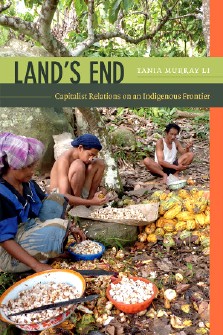|
Land's
end : capitalist relations on an indigenous frontier / Tania
Murray Li. - Durham : Duke university press, 2014. -
XI-225 p. : ill. ; 23 cm.
ISBN 978-0-8223-5705-6
|
DESCRIPTION :
Drawing on two decades of ethnographic research in Sulawesi,
Indonesia, Tania Murray Li offers an intimate account of the emergence
of capitalist relations among indigenous highlanders who privatized
their common land to plant a boom crop, cacao. Spurred by the hope of
ending their poverty and isolation, some prospered, while others lost
their land and struggled to sustain their families. Yet the winners and
losers in this transition were not strangers — they
were kin
and neighbors. Li's richly peopled account takes the reader into the
highlanders' world, exploring the dilemmas they faced as sharp
inequalities emerged among them.
The book
challenges complacent,
modernization narratives promoted by development agencies that assume
inefficient farmers who lose out in the shift to high-value export
crops can find jobs elsewhere. Decades of uneven and often jobless
growth in Indonesia meant that for newly landless highlanders, land's
end was a dead end. The book also has implications for social movement
activists, who seldom attend to instances where enclosure is initiated
by farmers rather than coerced by the state or agribusiness
corporations. Li's attention to the historical, cultural, and
ecological dimensions of this conjuncture demonstrates the power of the
ethnographic method and its relevance to theory and practice today.
| ❙ |
Tania
Murray Li is Professor of Anthropology at the University of Toronto,
where she holds the Canada Research Chair in the Political-Economy and
Culture of Asia. She is the author of The Will to Improve:
Governmentality, Development, and the Practice of Politics
(…) ; coauthor of Powers of Exclusion: Land
Dilemmas in Southeast Asia ; and editor of Transforming the Indonesian
Uplands: Marginality, Power and Production. |
|
| CONTENTS |
Acknowledgments
Introduction
My
title plays on several meanings of land's end: the changed use of land,
the end of a customary system of land sharing, and the end of the
primary forest that had served as highlanders' land frontier, the place
in which they could expand when need or opportunity presented. It also
flags their sense of bewilderment — coming to a dead
end,
the end of a peninsula surrounded by sea, without a raft or a sense of
direction. (p. 2)
1. Positions
— examines
the processes that formed identities and drew highlanders, merchants
and government authorities into particular sets of relations over the
two centuries before 1990. (Introduction,
pp. 28-29)
2. Work and Care
— takes
a fine-grained view of some highland neighborhoods to explore relations
of work and care among highlanders in the period when they had plenty
of land, and they grew their own food. (Introduction, p. 29)
3. Enclosure
—
explores the process of enclosure that began around 1990 when
highlanders began to plant cacao on their common land. It tracks the
emergence of a concept of land as a bounded unit of space that could be
privately owned, bought, and sold.
(Introduction, p. 29)
4. Capitalist Relations
—
explores how capitalist relations emerged in the highlands as land,
labor, and capital started to move in circuits defined by competition
and profit. (Introduction, p. 29)
5. Politics, Revisited
—
examines highlanders' responses to increasingly entrenched inequality,
and the politics that emerge from this conjuncture. (Introduction, p. 29)
Conclusion
Appendix: Dramatis Personae
Notes, Bibliography (pp. 205-219), Index
|
|
| COMPLÉMENT
BIBLIOGRAPHIQUE |
- « Agir
pour les autres :
gouvernementalité, développement et pratique du
politique » traduit de l'anglais par Fadhila Le Meur
et
Pierre-Yves Le Meur, Paris : Karthala, 2020
|
|
|
| mise-à-jour : 8
février 2022 |
 |
|
|
|